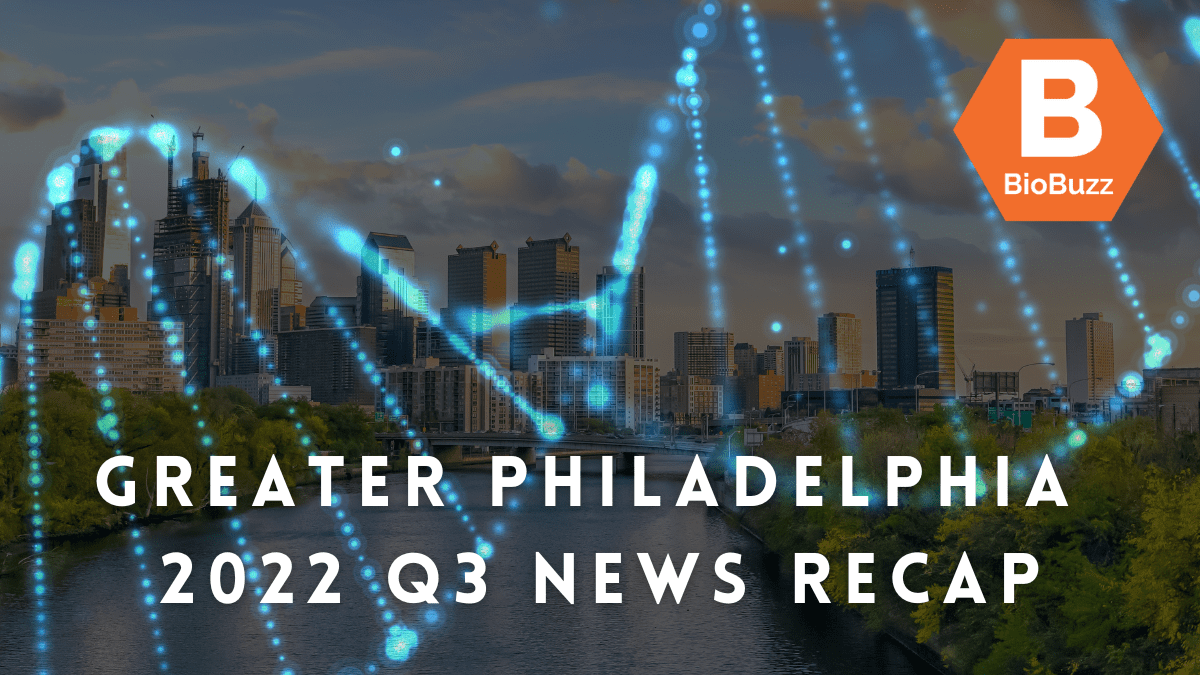
Philadelphia 2022 Q3 News Recap – Cellicon Valley Continues to Showcase Strengths
According to the recent Life Sciences Research Outlook & Cluster Rankings report from JLL, the Greater Philadelphia region has advanced four positions in the Life Sciences Cluster Composition Matrix, which measures how each market stacks up in terms of human and physical capital. The regional improvement was due to increased and steady funding supporting the specialization of cell and gene therapy research being conducted in the area, which comes as no surprise as these therapies continue to become increasingly important options in disease treatment.
Joe Colletti, Executive Vice President at JLL, said the Philadelphia market is “well-positioned for even greater growth in the coming years with millions of square feet in lab space expected in the next 12-24 months already in progress”
Below are a few of our favorite news stories out of Q3 2022 showcasing recent growth in Cellicon Valley:
Verismo Therapeutics Heads to the Clinic
Verismo Therapeutics received clearance from the FDA to begin clinical trials of its investigational asset for oncology, SynKIR-110.
The Philadelphia-based company will initiate the Phase 1 STAR-101 study to assess SynKIR-110 in patients with mesothelin-expressing ovarian cancer, cholangiocarcinoma and mesothelioma. The company, a spin-out of the University of Pennsylvania, plans to develop the experimental drug for cases of high, unmet need in cancer that have limited five-year survival rates. The rates for these indications are 49.7% for ovarian cancer, 30% for cholangiocarcinoma and 10% for mesothelioma.
SynKIR-110 is part of Verismo’s SynKIR T cells, a next-generation approach to cell therapy that targets solid tumors. The company’s approach is powered by the KIR-CAR platform.
Chief Executive Officer Bryan Kim told BioBuzz that the company’s technology platform provides a physical separation of the tumor-binding and the T-cell activating signals that work outside of the CD3 pathway. As a result, Verismo’s KIR-CAR are able to fully activate upon tumor encounter, as well as rest down and recover between rounds of tumor attacks, he said.
Idera Pharmaceuticals Makes Acquisition
Pennsylvania-based Idera snapped up N.C.-based Aceragen to bolster the company’s rare disease portfolio, addressing rare, orphan pulmonary and rheumatic diseases for which there are limited or no available treatments.
Key assets included in the deal are ACG-701 and ACG-801, experimental treatments for cystic fibrosis and melioidosis patients and Farber disease, respectively.
A formulation of sodium fusidate, ACG-701, is being developed as a potential treatment for acute pulmonary exacerbations associated with cystic fibrosis and for melioidosis, a life-threatening infection caused by the B. pseudomallei pathogen. A Phase 2 study in cystic fibrosis is expected to begin by the end of this year. A mid-stage trial in melioidosis is ongoing, with data expected in the second quarter of 2023.
ACG-801 is an investigational biologic enzyme replacement therapy being developed for the treatment of Farber disease, a lysosomal storage disorder. Farber disease is a progressive rare disease that has profound morbidity and often premature death. Currently, there are no Farber disease-specific treatments that can alter the natural history of the disease. A clinical trial is expected to begin in 2023.
LucasPye BIO Readies for Biomanufacturing Boom, CEO Attends Historic White House Panel
With an eye on the future of the bio-economy, President Joe Biden issued an executive order to boost biomanufacturing in the United States. The president’s order includes $2 billion to position the nation’s biomanufacturing industry through training programs, as well as improvements in technology that are expected to lower prices, strengthen supply chains and reduce carbon emissions.
Dr. Tia Lyles-Williams, Chief Executive Officer of Philadelphia-based LucasPye BIO (LPB), a biologics contract development and manufacturing organization (CDMO), is chomping at the bit to embrace the work ahead to fulfill the outlined goal. Lyles-Williams, who attended a recent White Hous panel following the announcement, is ready to embrace the work ahead in order to expand opportunities for her company, as well as for other biomanufacturing organizations across the country.
Lyles-Williams said the Biden plan reminded her of the Works Progress Administration, the New Deal public works program initiated in the 1930s in response to the Great Depression. The initiative from the Franklin D. Roosevelt administration put millions of men and women to work in manufacturing roles. Lyles-Williams said the new White House initiative will now put Americans to work manufacturing medications, medical supplies and more.
Windtree Hits the Mark
Windtree Therapeutics’ Phase 2 study assessing istaroxime in early cardiac shock hit the mark. Data from the study, published in the European Journal of Heart Failure, showed istaroxime can rapidly and significantly improve blood pressure and other key parameters of cardiac function in a failing heart.
Data from the Phase 2 SEISMiC study showed significantly improved systolic blood pressure in patients treated with the drug. The company said that the study met its primary endpoint at six hours, and the improvement in blood pressure profile persisted through 24 hours.
In addition to the primary endpoint, istaroxime met multiple secondary endpoints including improved assessments of cardiac function in the left atrial area and left ventricular end systolic volume. Left ventricular end diastolic volume was also decreased with treatment, the company noted.
J&J Backs Health Equity Challenge
Life sciences giant Johnson & Johnson continues to provide financial support and mentorship to Philadelphia organizations that aim to eliminate health inequities for people of color. For the second year in a row, J&J backed the Health Equity Innovation Challenge. This year, the company supported three different organizations in the City of Brotherly Love. One of the groups, The eCLOSE Institute has developed a classroom-based “project in a box” that brings teachers, scientists and students together to investigate solutions that address the health issues prevalent in their own communities. The institute provides lab kits to school groups in Philadelphia that provide students with the ability to become researchers and explore drivers in diseases that typically affect their communities in higher numbers, such as diabetes or prostate cancer.
The Maternity Care Coalition (MCC) provides support for families during pregnancy and in the first several years of a child’s life. MCC’s program offers doula and breastfeeding support and helps pregnant families prepare for childbirth. The other organization that received backing from J&J is Viora Health. The company’s mission is to engage underserved populations who struggle to manage their healthcare goals due to social and behavioral barriers. The organization’s technology programs wrap were developed to reduce costs of care for patients with social needs by empowering them to better access healthcare at home.






